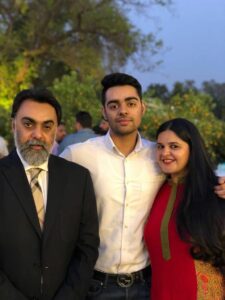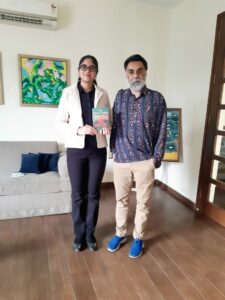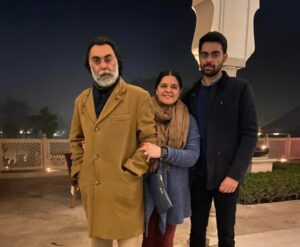 “The main motive of any creative media is to propagate the semblance of shared pain and empathy.” During an interview with Keekli Intern, Sangeeta Sambhi found that with an erudite approach, a diversified field of work and a sense of calm towards leading life, Khushwant Singh, the State Information Commissioner of Punjab, aspires to increase public transparency along with touching lives of myriad people through his passion for writing.
“The main motive of any creative media is to propagate the semblance of shared pain and empathy.” During an interview with Keekli Intern, Sangeeta Sambhi found that with an erudite approach, a diversified field of work and a sense of calm towards leading life, Khushwant Singh, the State Information Commissioner of Punjab, aspires to increase public transparency along with touching lives of myriad people through his passion for writing.
Khushwant Singh has lived the life of a farmer, but now holds one of the most reputed constitutional posts; throughout his career he has held multifaceted roles, managing all of them quite well. Those include, him working as a journalist and columnist with newspapers such as The Times of India and Hindustan Times; as a TV host; an editor and of course as a farmer.
 Author of five books, the most recent one being The Opium Toffee, a love story set during the times of strife in Punjab. His achievements are commendable as three of his books are now being adapted into films or web series. One of his biographies, Turbaned Tornado: The Oldest Marathon Runner Fauja Singh is being directed by Omung Kumar of Mary Kom fame. Not only this, but his novel Maharaja In Denims, which was published in 2014, is also being adapted into a film by a well-known and diverse producer Guneet Monga. Lastly, The Opium Toffee has been taken up by Keroscene Films to be produced as a web series.
Author of five books, the most recent one being The Opium Toffee, a love story set during the times of strife in Punjab. His achievements are commendable as three of his books are now being adapted into films or web series. One of his biographies, Turbaned Tornado: The Oldest Marathon Runner Fauja Singh is being directed by Omung Kumar of Mary Kom fame. Not only this, but his novel Maharaja In Denims, which was published in 2014, is also being adapted into a film by a well-known and diverse producer Guneet Monga. Lastly, The Opium Toffee has been taken up by Keroscene Films to be produced as a web series.
Keekli Reporter: Since you hold your main occupation as a civil servant, I am keen to know about your vision for the nation?
 Khushwant Singh: My role as the State Information Commissioner basically lies in protecting and maintaining the true essence and soul of the Right to Information (RTI) Act, which was launched by the government in the year 2005. Since then, it has been playing an important role not only in maintaining transparency in the government’s functioning, but also for the citizens. I aspire to serve the country with potential services of ensuring higher transparency amongst the public authorities.
Khushwant Singh: My role as the State Information Commissioner basically lies in protecting and maintaining the true essence and soul of the Right to Information (RTI) Act, which was launched by the government in the year 2005. Since then, it has been playing an important role not only in maintaining transparency in the government’s functioning, but also for the citizens. I aspire to serve the country with potential services of ensuring higher transparency amongst the public authorities.
Keekli: You have worn multiple hats including that of a journalist, columnist, TV host, editor and farmer, what is your mantra of balancing all these roles so well?
Singh: My mantra of balancing all these roles so well has always been to enjoy whatever I did and work hard at it. When I was into farming, I ensured to be a hard-working farmer. Likewise, when I write books, I work on them unflaggingly. Talking about my job of reporting as The Times of India journalist, I gave it all, to bring the best to the desk. Being passionate about what you do also counts as one of the factors. And the best part of all these qualities is that now I get to manage and play all these roles at once. It seems to be a hat stand, where you can choose which one to wear. I am a bit of a farmer, a bit of an author.
 Keekli: What inspired you to become an author?
Keekli: What inspired you to become an author?
Singh: While writing for newspapers, it struck me to shatter the glass ceiling by aiming at higher goals, especially of writing a book. Henceforth, I went to London and met with these inspirational authors who were already into the field and writing amazing short biographies. It inspired me to write my very first book, Sikhs Unlimited. Thereafter, there was no looking back, I kept on writing as it is a known fact that once you are into a field you grow organically.
Keekli: Your domain of work mainly lies in fiction; do you believe in the quote by Paul Hawkins, “Stay faithful to the stories in your head”?
Singh: It goes without saying that one is always faithful to their stories and land. My domain of work encircles around Punjab. I have worked on both fiction and non-fiction genres while writing. I have written the biography of Captain Amarinder Singh, which was very well-received by the readers. Not only this, I have also written the biography of Fauja Singh, who was one of the oldest marathon runners, which is now being adapted into a film. Other than this, two more books written by me are being adapted into films. In any case, one has to be honest with their subject, otherwise it reflects.
Keekli: Talking about The Opium Toffee, at what point you thought that you were confident enough to take it up as your next literary project?
Singh: It is an interesting fact actually. Usually, the norm follows the content to be written at first and then the title is adapted. Whereas in this case, I finalised the title first and then started writing about it.
Keekli: What is the nutshell of the book and what is it centred around?
Singh: The book is a love story, which revolves around times of strife in Punjab. It showcases the vandalising effects of how, the boils of turmoil, can take a toll on one’s life and change the gear of one’s fortune. How, by taking one wrong step, Ajit (the protagonist) landed up falling prey to extremism and drugs. Therefore, the book entails numerous layers.
Keekli: The book revolves around the central theme of love superseding all expectations; what according to you is love?
Singh: According to me, love is present in all forms. It is a general approach towards fellow human beings. Between two people, there is something that connects them, this emotion is love. When relationships are formed, the tenacity of love may vary, but it keeps people grounded.
Keekli: What role does love play in the lives of people in the contemporary times?
Singh: I believe love can never go out of fashion. Though we can state that it is put on a back burner these days, as people lead a fast-paced lifestyle. It is like a hallow around beings whose spirit can never be beaten.
Keekli: It is said that effective writing demands a high quotient of creativity; what motivated you to add the twist of the intersection of the traverse London of ‘90s and the turbulent conditions of Punjab during the ‘80s?
Singh: They are not interconnected for the larger part. Some stories have been set in Punjab, while some in Chandigarh. As you will read, you will also realise that few elements of the story have been set in London and Russia as well. An important aspect of the book has been set in Strand, one of the most famous fleet streets of London.
Keekli: What was your vision for the audience while you were working on the book?
Singh: An author never writes according to the need of his audience. According to me, an author bridges the gap of relatability amongst the audience. How uninfluenced thoughts of an author influences swathe is a work of art. Rather, the author is the one who believes in his own vision of content and just writes. If an author is true to his content, the book eventually finds its audience. Whether the audience is attracted in large numbers or small that is a separate agenda, but even after writing five books, I have never stopped from expressing myself.
Keekli: As a raconteur, how would you like the audience to perceive the central theme of the book?
Singh: Since the book has been written around the times of strife and utter chaos, in its creative nutshell, I would like a feeling of empathy and shared pain to be carried forward as a perception. It is moreover a basic motive of every creative activity to be perceived in sheer mutuality, but sometimes, the results turn out to be otherwise. If we take up the example of the non-fiction genre, there is only a selected amount of audience that can relate to the content. Likewise, if we talk about fiction, then the diversity of audience can relate to the emotions being expressed in their own myriad ways. The idea is also to not spread hate, rather understand the misery of the victims.
Keekli: By now we have been acquainted with your semblance and excellence in the field of literature; but as a successful columnist, what tips and tricks would you share with youngsters like us?
Singh: First of all, consistency is the key. As important it is to have the ability to do a task, evenly-kneeled amount of endurance shares the limelight of importance. Anyone who wants to write a book, should be able to have the capacity of returning to their work every morning, be it just writing one line by itself. The goal is to keep achievable targets and be on the go, not being too harsh on yourself. That way you will be able to complete it, as it will flow on its own.
The second thing would be to not sensationalise the content. Present your story as it is, in a language which is erudite and entices people to read it.
Not compromising on the research aspect, would be the third factor responsible for smooth flow of writing. It opens up avenues for creativity. Also, traveling while you are writing would also prove to be helpful in understanding things from a different perspective. There are so many other factors, such as listening and reading a lot, that way you understand the different writing styles.
Keekli: Videography has a greater reach, as things are made easier to comprehend. How do you perceive the Indian cinematography?
Singh: I am yet to see the outcome of my book being showcased in the form of movies or web series. But there is one thing that I would like to state, I won’t compare the two mediums – literature and cinema. They weigh their own pros and cons as they can be presented in numerous ways.
Keekli: Since your book will soon be showcased in the form of web series, what role do you think cinema plays in influencing swathe?
Singh: Cinema plays a greater role in influencing swathe. It is a great medium of involving with the audience as millions of people are connected through a screen. I have propagated the idea of shared pain and empathy through print form and words. If the same message continues to be perceived by the audience, through a visual format my motive behind writing the book would be fulfilled. Any creative medium aspires to connect the audience with the authors stark and powerful imagination.
Keekli: Are there any learnings from the experiences you have had in life?
Singh: Life is a learning process. The five books that I have written, have taught me a lot about how life wraps itself around certainties and uncertainties. While writing the biography of Fauja Singh, I learned about the shared power of human will, likewise, from Captain Amarinder Singh, I learnt about so many good qualities of human decency, how good bonds are made, is one of the few things I cherish. Even while writing Maharaja in Denims, the research involved in writing it added to my box of experiences.
Keekli: Any message you would like to share with our readers?
Singh: An idealistical message for my audience would be to read the book and understand the misery of the people who survived the riots of Punjab in the ‘80s. Pain of people like me, who almost lost a whole childhood, has been expressed by me through this book.
My only spiritual message for the audience, would be to remain grounded and calm. Educate yourself, as it helps in all walks of life. My book journey has also taught me to not be unnecessarily harsh on yourself. These learnings are all that it takes to lead a healthy and balanced life.


wow, another beautiful piece. loving this new interview format, getting to know very interesting people up close.
Thank you